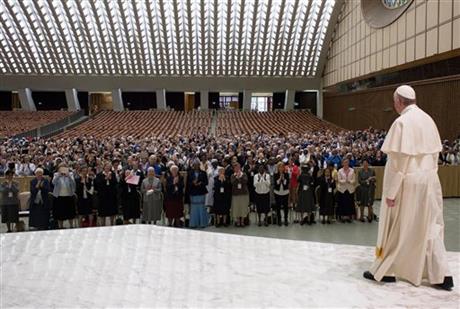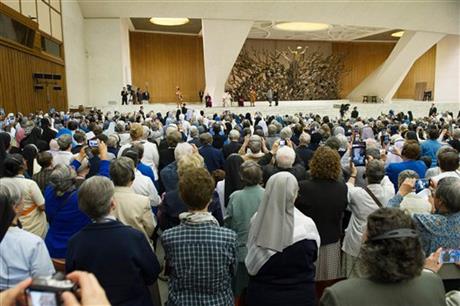- California Assembly OKs highest minimum wage in nation
- S. Korea unveils first graphic cigarette warnings
- US joins with South Korea, Japan in bid to deter North Korea
- LPGA golfer Chun In-gee finally back in action
- S. Korea won’t be top seed in final World Cup qualification round
- US men’s soccer misses 2nd straight Olympics
- US back on track in qualifying with 4-0 win over Guatemala
- High-intensity workout injuries spawn cottage industry
- CDC expands range of Zika mosquitoes into parts of Northeast
- Who knew? ‘The Walking Dead’ is helping families connect
Pope says he’s willing to study whether women can be deacons

Pope Francis arrives for a special audience with Superiors General of Institutes of Catholic Women Religious in the Paul VI Hall at the Vatican, Thursday, May 12, 2016.
VATICAN CITY (AP) — Pope Francis said Thursday he is willing to create a commission to study whether women can be deacons in the Catholic Church, signaling openness to letting women serve in ordained ministry currently reserved to men.
Francis agreed to a proposal to create an official study commission during a closed-door meeting with some 900 superiors of women’s religious orders in Rome for their triennial assembly.
Deacons are ordained ministers but are not priests, though they can perform many of the same functions as priests: preside at weddings, baptisms and funerals, and preach. They cannot, however, celebrate Mass.
Currently, married men — who are also mostly excluded from the Roman Catholic priesthood — can serve as deacons. Women cannot, though historians say women served as deacons in the early Church.
The pope in no way signaled during a 75-minute conversation with the sisters that the church’s longstanding prohibition on women priests will change. But asked if he would be willing to create a commission to study whether women could serve as deacons, Francis said he was open to the idea, according to the National Catholic Reporter and Catholic News Service, which had reporters in the audience hall.
The publications quoted Francis as saying: “I accept. It would be useful for the church to clarify this question. I agree.”
Vatican Radio also reported on the pope’s comments.
Francis noted that the deaconesses of the early church weren’t ordained as they are today. But he said he would ask the Congregation for the Doctrine of the Faith to report back on studies that have been done on the issue, Catholic News Service said.
Francis also said he would ask another Vatican office that is in charge of the liturgy to explain more fully why women aren’t allowed to give a homily at Mass. Women can only preach at services where people do not receive communion.
The Women’s Ordination Conference, which advocates for women priests, praised Francis’ willingness to create a study commission as a “great step for the Vatican in recognizing its own history.”
“Biblical evidence names several women deacons, working alongside men in the early Church including: Phoebe, St. Olympias, Dionysia, St. Radegund and St. Macrina,” the group said in a statement.
The Rev. James Martin, a Jesuit author, said reviving women deacons would benefit the whole church.
“The female diaconate is not only an idea whose time has come, but a reality recovered from history,” he said in an email. “This is news of immense joy for the church.”
From the start of his pontificate, Francis has insisted that women must have a greater decision-making role in the life of the church, while reaffirming that they cannot be priests. He has said repeatedly that he values the “feminine genius,” that there’s no reason why a woman couldn’t head certain Vatican offices and that the church hierarchy would do well to hear more from women because they simply see things differently to men.
But history’s first Latin American pope has also hit a few sour notes with women, calling Europe an infertile “grandmother,” urging nuns not to be “old maids” and once terming new female members of the world’s leading theological commission as “strawberries on the cake.”
On Thursday, he drew round after round of applause as he spoke freely with the sisters, asking them to challenge him and lamenting how so often nuns find themselves working as “servants” for priests, bishops and cardinals in ways that “undervalue their dignity.”
The sisters cheered when he suggested that priests should instead pay local women to do the housework so that the sisters could teach, care for the poor and heal the sick, Catholic News Service said.
“I like hearing your questions because they make me think,” CNS quoted Francis as saying. “I feel like a goalie, who is standing there waiting for the ball and not knowing where it’s going to come from.”









![앤디 김[로이터]](http://www.koreatimesus.com/wp-content/uploads/2025/01/20241220094728671-120x134.jpg)


